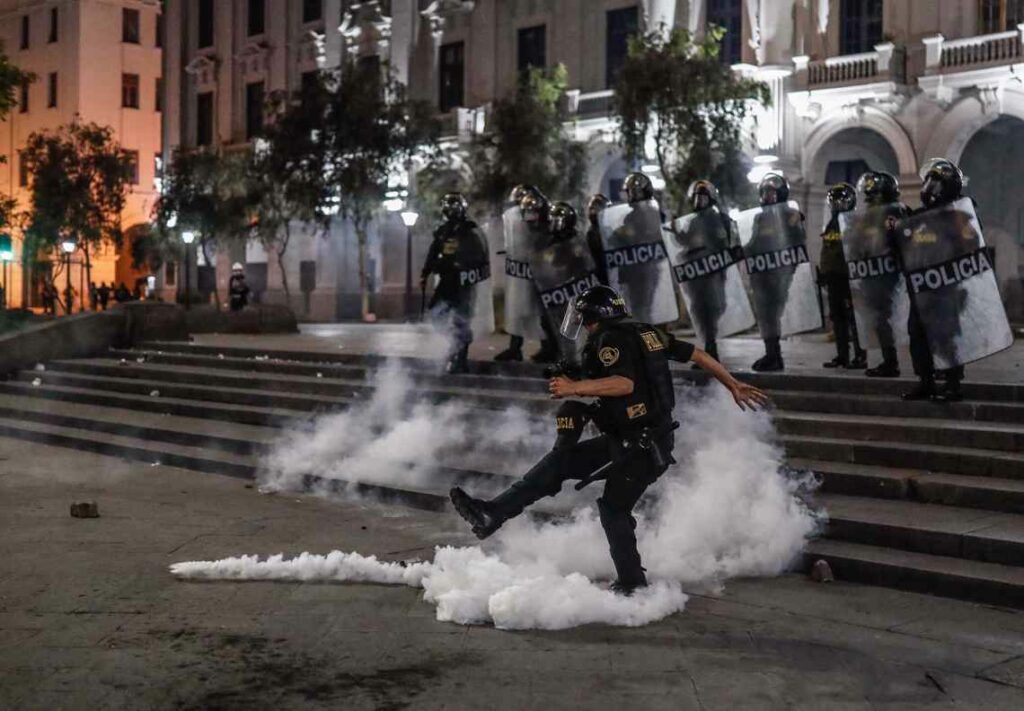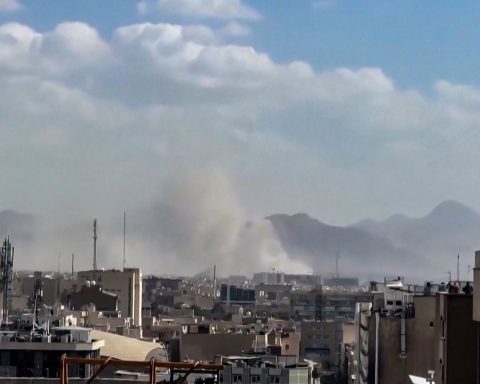▲ Some fear that the assault on the Capitol will be imitated on January 1, when Lula da Silva takes office in Brazil, warns Noam Chomsky. In the image, the US legislative headquarters, in Washington, DC.Afp photo
CJ Polychroniou
Newspaper La Jornada
Monday December 12, 2022, p. 17
Neoliberalism has held the supreme reign as an economic philosophy for nearly half a century. But neoliberal policies have wreaked havoc around the world by reversing the gains made by capitalism after World War II. Neoliberalism works for the rich and huge corporations, but its failures go beyond the economic. They extend towards the political as a process of social collapse with the participation of threatening forces that promise the return of past glories. This is the basic drive of neo-fascist movements and parties in the world today, and neoliberalism has created the conditions for far-right extremism to reemerge, as Noam Chomsky explains in this exclusive interview with Truthout.
Unbridled class war
–(CJ Polychroniou) Noam, for more than 40 years neoliberal policies have been responsible for the growing levels of inequality. What is the current connection between neoliberalism and neofascism?
–(Noam Chomsky) One consequence of neoliberal socioeconomic policies is the collapse of the social order that leads to a breeding ground for extremism, hate violence and the search for scapegoats. It is fertile ground for authoritarian figures to adopt the savior stance and thus we are on our way to neo-fascism.
“The current political model opened the doors wide to the masters of the economy who also dominate the State in search of profit and power with very few restrictions. In short: it leads to unbridled class warfare.
“One component of the policies is a form of globalization that combines extreme protectionism towards masters who seek the worst and cheapest working conditions for the maximum possible profit. The result with wide belts of poverty in their countries of origin. These are decisions made based on business policy, not economic necessity.
“Another consequence derived from ‘real existing neoliberalism’ is the rapid financialization of the economy that allowed fraudulent operations to obtain immediate profits without risk. The risks disappear because the powerful State intervenes radically in the market to offer extreme protection to trade agreements and does the same by bailing out the masters when something goes wrong for them. The result, beginning with Reagan, is what economists Robert Pollin and Gerald Epstein called ‘bail-out economics’, which allows neoliberal class warfare to proceed without risk of failure in the face of market punishment.
“The class war started in a very natural way, when the unions were attacked, the main means of defense for the workers. The early Reagan and Thatcher bills were vigorous assaults on unions and invitations to the corporate sector to join in and move further, often in ways that are technically illegal, but that’s no problem for the neoliberal states they dominated.
“The neoliberal class war has been a great success for those who designed it. The Democrats abandoned the working class and handed it over to the enemy in the 1970s, becoming the party of wealthy professionals and Wall Street givers. In England, Jeremy Corbyn came close to reversing the decline of the Labor Party that was becoming ‘Thatcher Light’. The British establishment at all levels mobilized their forces and reached further into the gutter to crush his effort to create a genuine participatory party dedicated to the interests of workers and poor. An intolerable affront to good customs. In the United States, Bernie Sanders has fared a little better, but he has not been able to break the Clintonite yoke that controls the Democratic Party. In Europe, the traditional parties of the left have practically disappeared.
The ground is well prepared for the rise of neo-fascism to fill the void left by relentless class warfare and the capitulation of conventional political institutions that could have combated the plague.
The fascist threat
–With the arrival of Donald Trump to power, white supremacy and authoritarianism returned to mainstream politics, but does this mean that the United States was never immune to fascism?
– What do we understand by fascism
? We have to distinguish between what happens in the streets very visibly and the ideology and politics that are further away from our immediate perception. Fascism in the streets are Mussolini’s Black Shirts and Hitler’s Brown Shirts: violent, brutal and destructive. The United States has certainly never been immune to that.
“The issue becomes moot with the shift from the regulated capitalism of the postwar decades to the neoliberal assault, which forcibly reinstated Adam Smith’s conception that the masters of the economy are the chief architects of government police and designed it. to protect your interests. Increasingly, during the course of the neoliberal class war, there were unreported concentrations of private power in order to control the political and economic domains.
“The result was a general sense – not at all wrong – that the government was not serving us but someone else. The doctrinal system, largely in the hands of those who concentrated private power, distracted attention from labor power and opened the door to what came to be called ‘conspiracy theories’, normally based on a few particles of evidence: there was the Great Replacement theory, liberal elites, the Jews, and other familiar hodgepodge. This, in turn, engendered ‘street fascism’ which attracted poisonous undercurrents that have never been exhausted and are easily resorted to by unscrupulous demagogues. At the present time, the scale and character of these is no small threat to what prevails as a functioning democracy, after the beating it has received in recent times.”
protests of a new kind
Q: Why have political protests become more widespread and more frequent in this recent era of neoliberalism? How do these movements compare to those of the 1960s?
The protests have different roots. The truckers’ strike that nearly paralyzed Brazil against the defeat of the neo-fascist Bolsonaro at the end of last October has similarities to the one on January 6 in Washington and may have been an imitation of it. Some fear that the assault on the Capitol will be imitated on January 1, during the inauguration of President-elect Lula da Silva.
“But protests like this have nothing in common with the rare uprising in Iran sparked by the death in custody of Mahsa Amini. These mobilizations are led by young people, mostly women, which means that much broader sectors participate. The protesters have scored some victories. The regime indicated that the Moral Police has been dissolved, despite the fact that some doubt the veracity of the announcement, which, even if it is true, does not meet the demands of the courageous resistance by far.
To the extent that there is a common thread – this is the first break in the social order in decades – the similarities to the protest movements of the 1960s seem few to me.
ideas against propaganda
–Whatever the connection between neoliberalism and social discontent, it is clear that socialism is still trying to gain popularity. Is it the legacy of existing real socialism
the one that slows down progress towards the socialism of the future?
As with fascism, the first question is what do we mean by socialism
. Broadly speaking, the term is used to refer to social ownership of the means of production, with worker control over the enterprises. The current and existing socialism
has virtually nothing resembling those ideals. Western usage of the term socialism
it has become something like welfare within a capitalist state, covering a range of options.
“Initiatives like this have been suppressed by violence. The ‘red terror’ is an example with lasting effects. Not long after, the Great Depression and World War evoked waves of radical democracy in much of the world. The main task of the victors was to eliminate them, beginning with the US-British invasion of Italy, where socialist initiatives led by partisans, workers and day laborers were dismantled, and the traditional order including fascist collaborators was restored. This pattern was followed elsewhere in a variety of ways, sometimes including extreme violence. Russia imposed its iron rule on her own dominions. In the third world, the repression of similar tendencies was much more brutal, not excluding the initiatives that emerged from the Church, crushed by US violence in Latin America where the US military claimed credit for helping to defeat the theology of the Liberation.
Do basic ideas become unpopular when extracted from hostile propaganda images? There is good reason to suspect that they lie just below the surface and can emerge any time the opportunity arises and is seized.
truthout
Full text in The Conference online:
Translation: Gabriela Fonseca

















